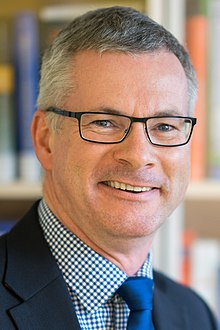Hubert Huppertz (chemist)
Hubert Huppertz (born May 2, 1967 in Münster ) is a German chemist .
Life
Huppertz attended the Wolbeck high school , where he passed his Abitur in 1987 and in the same year began his basic military service with the 7th Medical Battalion 110 in Leer (East Friesland) and the Army Music Corps 100 in Münster. Then Huppertz committed himself for two more years to serve the country as 1st flautist with Army Music Corps 100 in Münster.
From 1989 to 1995 he studied chemistry at the University of Bayreuth , which he completed with a dissertation on the topic of structural extensions of nitridosilicates . It was in 1997 in the laboratory of Wolfgang Schnick for Dr. rer. nat. PhD . He then did research as a postdoctoral fellow at the Ludwig Maximilians University in Munich at the Chair of Inorganic Solid State Chemistry in Wolfgang Schnick's group and received his habilitation in 2003 with work on new oxoborates by Multianvil high-pressure / high-temperature syntheses .
In 2008, Huppertz accepted an appointment at the Leopold Franzens University in Innsbruck , Austria, where he has been researching and teaching as a university professor ever since. At the same time, he turned down a call to the University of Hanover . Since 2013 he has been Dean of the Faculty of Chemistry and Pharmacy at the University of Innsbruck. From 2013–2018 he was Vice President of the Society of Austrian Chemists and from 2014–2017 he was a board member of the GDCh - Section Solid State Chemistry and Materials Research . Since January 1, 2019, he has been Deputy Chairman of the Austrian Association of University Professors.
research
Huppertz and his research group dedicated to the exploratory solid state synthesis of new compounds in the substance classes of borates, fluoride and Fluoridoborate, Borogallate, Borosulfate, Boro Germanates , gallate, borate nitrates , Galliumoxo- nitrides , rare - molybdates , intermetallic phases and borides . In recent times, research activities have also been extended to oxosilicates, oxonitridosilicates and nitridoaluminates, with the focus often being on doping them with rare earth cations.
The syntheses of the aforementioned classes of compounds are carried out both under atmospheric conditions ( high-frequency oven, tube oven, chamber oven) and under high pressure conditions (Multianvil press). In addition to the standard solid-state syntheses, other synthetic methods such as B. Solvothermal or ampoule syntheses new compounds are already being synthesized.
The focus is primarily on structure elucidation using X-ray diffraction methods and the characterization of the initially unknown compounds. In the best case scenario, there is then continuous further development through to the application of these new materials. This also happens in part in various industrial cooperation projects. Above all, magnetic, optical and mechanical properties as well as thermal stability of the new substances are examined. Compounds of the substance classes listed above already showed properties such as non-linear optical behavior, luminescence and photocatalytic activity.
Awards
- 2000: HC Starck PhD award
- 2006: Dr. Römer Prize of the Institute for Chemistry and Biochemistry at the Ludwig Maximilians University in Munich
- 2007: Dr. Römer Prize of the Institute for Chemistry and Biochemistry at the Ludwig Maximilians University in Munich
- 2009: Lupe Award for excellent science communication in Austria
- 2010: Teaching Plus! 2010 - Prize of the Leopold-Franzens University Innsbruck for excellent teaching
- 2019: Research award from the Südtiroler Sparkasse Foundation
(taken from CV)
Web links
- Homepage of Hubert Huppertz on the website of the University of Innsbruck
- List of publications by Hubert Huppertz on the website of the University of Innsbruck
- Vita on the website of the University of Innsbruck
- Julian Bathelt: The professor lets the sparks fly in the laboratory , in: Tiroler Tageszeitung
- Award of the research award of the Stiftung Südtiroler Sparkasse to Hubert Huppertz
Individual evidence
- ^ A b Lukas Dornauer, Sonja Haller: Curriculum vitae - University of Innsbruck. Retrieved April 27, 2017 .
- ^ Presidium. Austrian Association of University Professors, accessed on April 29, 2019 .
| personal data | |
|---|---|
| SURNAME | Huppertz, Hubert |
| BRIEF DESCRIPTION | German chemist |
| DATE OF BIRTH | May 2, 1967 |
| PLACE OF BIRTH | Muenster |
